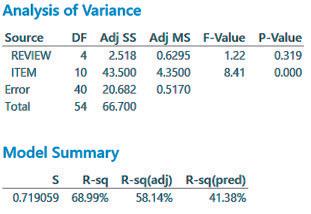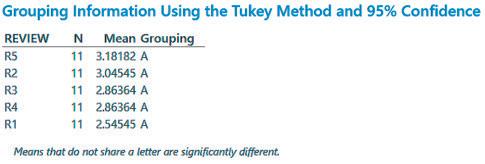When evaluating research reports in health care, a popular tool is the Assessment of Multiple Systematic Reviews
Question:
When evaluating research reports in health care, a popular tool is the Assessment of Multiple Systematic Reviews (AMSTAR). AMSTAR, which incorporates 11 items (questions), has been widely accepted by professional health associations. A group of dental researchers has revised the assessment tool and named it R-AMSTAR (The Open Dentistry Journal, Vol. 4, 2010). The revised assessment tool was validated on five systematic reviews (named R1, R2, R3, R4, and R5) on rheumatoid arthritis. For each review, scores on the 11 R-AMSTAR items (all measured on a 4-point scale) were obtained. The data are shown in the table at the bottom of the page.
a. One goal of the study was to compare the mean item scores of the five reviews. Set up the null and alternative hypotheses for this test.
b. Examine the data in the table and explain why a randomized block ANOVA is appropriate to apply.
c. The Minitab output for a randomized block ANOVA of the data (with Review as treatments and Item as blocks) appears below. Interpret the p-values of the tests shown.
d. The Minitab printout also reports the results of a Tukey multiple comparison analysis of the five Review means. Which pairs of means are significantly different? Do these results agree with your conclusion in part c?
e. The experimentwise error rate used in the analysis of part d is .05. Interpret this value.


Step by Step Answer:

Statistics For Business And Economics
ISBN: 9780136855354
14th Edition
Authors: James T. McClave, P. George Benson, Terry T Sincich





